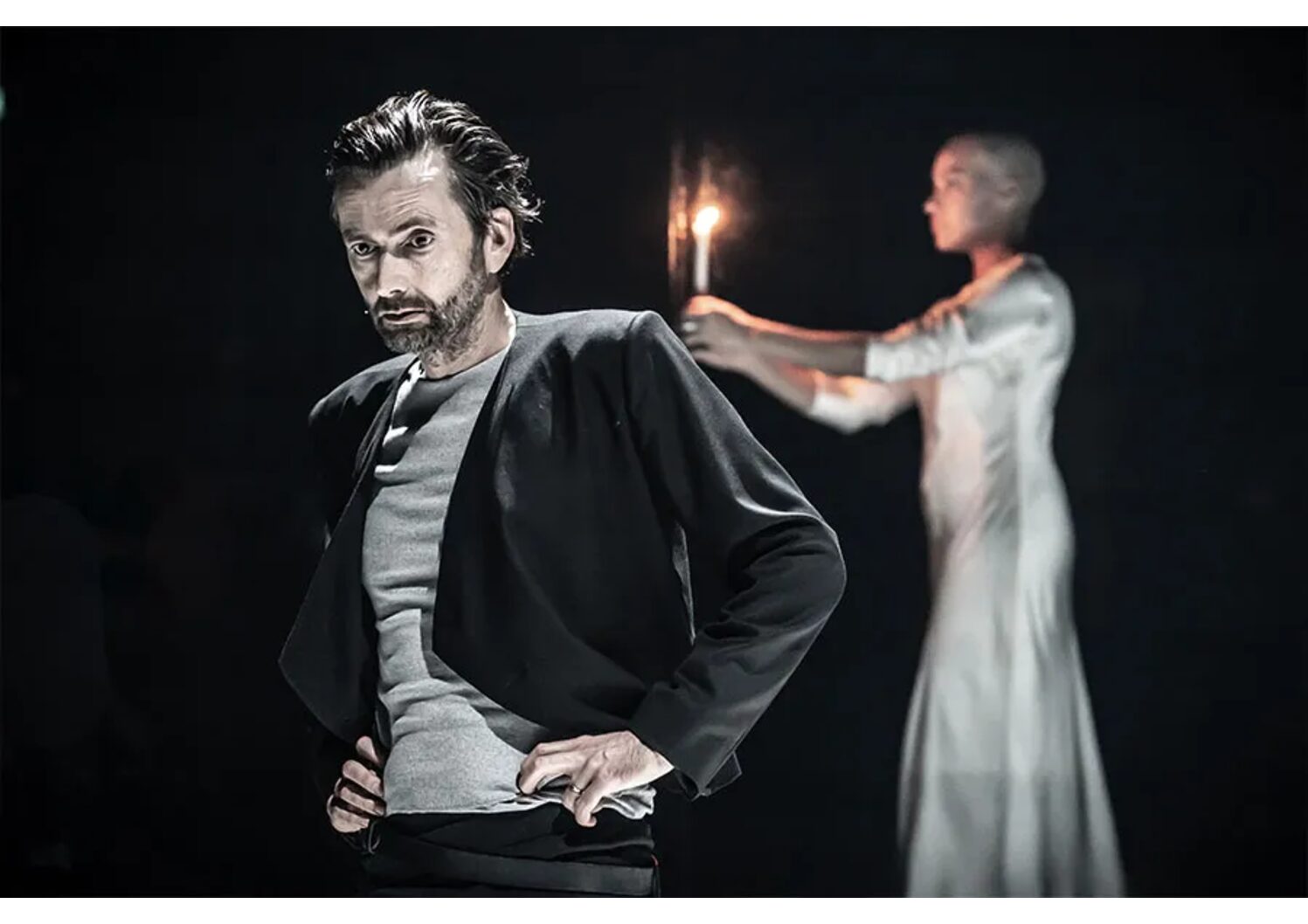If you are looking to experience a Shakespeare tragedy in a new way, then head over to the Harold Pinter Theatre to see, and hear, Max Webster’ production of Macbeth featuring David Tennant and Cush Jumbo as the eponymous murderous couple. The play is on a limited run having transferred from The Donmar Warehouse.
Webster’s conceit is to have the actors speak their lines in soft stage whispers, inaudible without the assistance of headphones, which are provided at every seat. The intimacy of the earphone acoustics gives the sound designer (Gareth Fry) ample opportunity to feed our ears with layers of echoed voices, the cawing or flapping of birds’ wings, even the horrific screeches of an offstage murder. The soundscape helps underpin the play’s leitmotif of what is seen and imagined, whether that is a dagger, Banquo’s ghost, the witches, or blood on Lady Macbeth’s hands. The production’s clever use of sound reinforces the notion of whether we believe our eyes or our ears – the witches, for example, remain unseen in their first encounter with Macbeth, and we hear them cackle and whisper only through headphones. Admittedly, it takes a few scenes to adjust to this device, but you can soon become seduced by these haunting, multi-layered voices, music and noises.
Eavesdropping on characters’ intimate moments is only part of the production’s strength – the stage is alive with actors playing multiple roles, always clearly differentiated and confidently enacted. One child actor plays all the children’s parts, for example. Tennant’s portrayal of Macbeth is complex and nuanced, and he transitions convincingly from awe and uncertainty, to the cruelty of planning multiple murders, and finally to remorse. He evens wrings some humour out of various lines and moments. The play’s “Tomorrow and tomorrow” speech must be known almost word-for-word by most audiences, yet Tennant is able to make us feel we are hearing his anguished words almost for the first time.
Cush Jumbo also brings enormous complexity to Lady Macbeth’s calculating ambition, and the production is richer for it. Her sleepwalking scene is a masterclass in the understated anguish of a guilty, tortured soul. Another call-out must go to Jatinder Singh Randhawa, whose brilliant monologue as the drunk porter is updated to an hilarious, stand-up comedy routine. His various one-liners fly fast and furious – whether about confusing Trump with Beelzebub, breaking the fourth wall, or what his partner sees under his kilt.
The set design provides further layering, with the a slightly raised white platform that is the central staging area, or at other times serves as a table. A long gallery runs along the back of the stage separated by a glass partition, which can both reflect the downstage action, or when lit from behind can reveal the musicians and actors upstage. Sometimes we see both the reflection and the upstage action simultaneously. The lighting is moody and effective – and the stage becomes bathed in blood-red light only once – when the witches reappear and we are reminded of the bloody body count that Macbeth’s leaves in his wake.
The play has been delicately edited, and comes in at just under two hours, sans interval. If you miss the production, there is, I’m told, an audio recording that will transport you to the eerie and mystical moors and castles of Scotland, and the nefarious whispered plottings of the evildoers in this cruel tragedy.
By: William Shakespeare
Director: Max Webster
Cast: David Tenant, Cush Jumbo, Cal Macaninch, Noof Ousellam, Rona Morison, Ros Watt, Benny Young, Moyo Akande, Jatinder Singh Randhawa
Designer: Rosanna Vize
Lighting Designer: Bruno Poet
Sound Designer: Gareth Fry
To: 14 December
Running time: 2 hours, without interval
Photo credit: Marc Brenner

